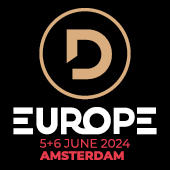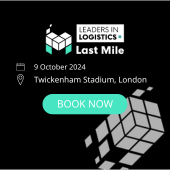Interview: Metapack’s chief customer officer talks peak, trends and M&A
.jpg)
Delivery management software provider Metapack delivered an “extremely successful” peak during 2022 and will roll out new products this year, while parent company Auctane could be open to more M&A deals “to fill gaps”, Tom Forbes, the firm’s Chief Customer Officer, told CEP-Research in an exclusive interview at The Delivery Conference (TDC) 2023 last week.
Forbes, who is also SVP of Channels at Auctane – a provider of shipping and fulfilment software solutions that operates brands including Metapack, and ShipStation, Stamps.com, ShippingEasy, ShipEngine, ShipWorks, and Endicia – said the company processed around 200 million packages and helped carriers tackle “the unpredictable nature of the postal strikes” in the UK during last year’s peak season.
He also discussed key challenges facing carriers and the mega trends set to impact the delivery sector over the next 12 months along with upcoming product updates at Metapack and revealed how acquisitions could be on the cards at Auctane as it looks for “like-minded market leaders” in the sectors it doesn’t serve currently.
How does Metapack fit into the Auctane family?
“We have a nice niche in the Auctane group of brands. Auctane is in effect the new name for Stamps.com. Stamps.com was listed on the Nasdaq Stock Market, but was taken private just over a year ago by Thoma Bravo – one of the largest private equity investors in the tech space. Following that, we all felt that the group company needed a rebrand, hence the new name Auctane – ‘fuelling e-commerce’. We are a family of companies serving everyone from the very largest retailers and 3PLs, which is the specialism of Metapack, through to micro shippers who may post something occasionally.
“Some of the other group brands, such as Stamps.com and Endicia, are very strong in the micro shipper space in the US. And we also have brands aimed at the mid-market. In Europe, for example, we have sister companies like Packlink and ShipStation, which both take care of that middle market – typically people selling on multiple marketplaces – very well. Metapack’s core remains working with the largest retailers and 3PLs who have very complex shipping needs, usually shipping internationally and require complex logic to manage delivers across multiple carriers.”
How was peak 2022 for Metapack?
“Peak went exceptionally well for us. The main thing we needed to get right was making sure the tech was fully available, which it was 100% of the time, across all our products. It was also blisteringly fast under pressure. We averaged about 149 milliseconds for a typical API response. Furthermore, on our peak day the number of websites calling us for delivery options was 5.7 million, which works out at about 70 a second.
“Our technology was stress-tested to the full during peak and it performed well. In addition to that, we also needed to support firms tackling the biggest challenge in the UK industry, which was the unpredictable nature of the Royal Mail strikes. Our role was to help people switch volumes to other carriers if needed.
How did peak 2022 compare to previous peak periods?
“Everyone is up on 2019. The underlying pattern of growth in e-commerce remains. 2020 was of course incredibly strong for the whole industry and we have seen a cooling off from that as stores have reopened and people have returned to the high street. 2022 may also have been impacted in the UK by the strikes and the late delivery of parcels that resulted.
“For all of us – whether you are a technology provider or a parcel carrier – it has been a challenging few years. We have all had to make difficult adjustments dealing with a wonderful peak during Covid to receding volumes, but we have all managed it.”
What are the key trends impacting the e-commerce delivery sector?
“One key trend I see in delivery is the growth of cross-border flows. There have been several challenges and market changes that have impacted the cross-border market in recent years, including Brexit, COVID-related capacity restrictions, a new customs system across Europe and new security initiatives, such as CTPAT in the US.
“When you combine lack of capacity and heavy regulations, I think a lot of players, particularly SMEs, have retrenched completely from selling cross-border, and I believe the larger sellers have been quite choosy in terms of the markets they do sell to.
“I think everyone is now itching to turn that back on, but I think the truth is that it will require some heavy lifting from quite a few people, such as those on the tech side for the execution and those involved in customs clearance, and regulatory compliance. The carriers also need to have the willingness to invest in those areas. I think this is a big macro trend, which will play out over time.”
Do you believe out-of-home (OOH) delivery will grow?
“Whilst OOH is prevalent in many markets, in Scandinavia and France for example, it isn’t in other markets. The UK is a classic example of where we have far less adoption of OOH delivery. I believe innovators such as Vinted, which offers drop off and pick up at parcel shops as its standard delivery method, is really opening a lot of consumers’ eyes to OOH, so I do believe it will grow. This will create plenty of challenges for retailers and carriers, and I hope that carriers will give retailers a cost advantage for OOH, compared to door delivery.
“OOH also has the potential to tackle several challenges impacting the e-commerce and delivery sector now. For example, it offers a more cost effective and sustainable delivery option and enables carriers to do more with less. The drop density you get delivering to a locker bank compared to stopping at every house on the street, for example, is compelling.”
Do you offer any sustainability options through your technology platform?
“We don’t currently, but we might one day. We can help firms with carbon reporting, however. There are two challenges that need to be solved to provide excellent carbon reporting. One is the availability of granular transportation data, which we do have and many of our customers use our data to generate their own reports. The other big challenge is to assign a carbon cost to each journey, which really needs to come from the carriers. It is very difficult to ensure that everyone measures everything in the same way. We will get there as an industry and I hope Metapack will play a leading part in that.
“We have also helped by working with a wave of new entrants into the parcel market who are focused on sustainable deliveries in Europe’s capitals, such as Urb-it, Zedify and HIVED. And we have probably added in excess of 10 of those carriers to our platform in recent months and we are starting to see them adopted.”
What new products and services are you launching in 2023?
“We currently have a big focus on tracking and data insight. On the tracking side, we are enhancing our existing product called Delivery Tracker, which helps retailers to offer their own brand of tracking notification, rather than bombard their consumers with their own and the carriers' messages. We are extending that to provide consumer data via webhook, for example. This will push notification-ready data bundles to retailers. They can then choose how to send that to consumers. If this pilot is successful, we will move on to offering a managed service for notifications.
“We are also building out our data product, called Intelligence, with the addition of a new machine learning tool to predict expected delivery dates, which will help with delivery promise to consumers. This is in prototype phase currently. It is all about segmentation and having data on which AI can act. Take last peak for example, if a retailer knew in real time the performance of the Chester depot, for example, they might choose to communicate differently with their consumers in that area.
Does Auctane plan to make any new acquisitions?
“We are looking for like-minded market leaders in sectors we don’t serve. I think the industry is ready for some consolidation. It has grown rapidly in the tech space, there is almost one technology company per segment, per market. Inevitably the market will probably benefit from a degree of consolidation, and as the largest player in the shipping tech sector we want to be part of that.”


